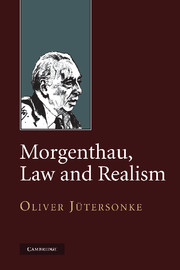Book contents
- Frontmatter
- Contents
- Preface
- Acknowledgements
- Note on the text
- 1 Hans J. Morgenthau in International Relations
- 2 The justiciability of disputes
- 3 Hans Kelsen and the reality of norms
- 4 Legal realism and behaviouralist social science
- 5 Legalism, romanticism and irresponsible statecraft
- 6 The legacy of legal formalism
- Name index
- Subject index
Preface
Published online by Cambridge University Press: 17 November 2010
- Frontmatter
- Contents
- Preface
- Acknowledgements
- Note on the text
- 1 Hans J. Morgenthau in International Relations
- 2 The justiciability of disputes
- 3 Hans Kelsen and the reality of norms
- 4 Legal realism and behaviouralist social science
- 5 Legalism, romanticism and irresponsible statecraft
- 6 The legacy of legal formalism
- Name index
- Subject index
Summary
Why another monograph on Hans J. Morgenthau? That question, perhaps posed by many picking up this book, is indeed a legitimate one. Ever since his rise to fame in the 1950s with his textbook, Politics Among Nations: The Struggle for Power and Peace, plenty has been written on the ‘realist theory of international politics’ advocated therein. Revolving around the notion of the (national) ‘interest defined in terms of power’, Morgenthau's work was for decades part of the standard repertoire of practically every introductory course in the field of International Relations, in both the anglophone world and beyond. Moreover, his outspoken views on Vietnam, nuclear deterrence and Middle East peace made Morgenthau a known quantity in foreign policy and media circles. Hans Morgenthau was, in many respects, one of the leading public intellectuals in the United States during the 1960s and 1970s.1 The multitudinous secondary literature and commentary on the man and his ideas bears testimony to this status.
In short, the present text is a reaction to a recent revival, starting in the late 1990s, of the work of Morgenthau in the academic field of International Relations. With the Cold War over and the global cards reshuffled towards asymmetric warfare and invisible enemies, scholars began looking around for inspiration from the ‘classics’ to fill the apparent void left by a body of theory that was perceived as being of decreasing utility for the twenty-first century. Hans Morgenthau was one of those rehabilitated.
- Type
- Chapter
- Information
- Morgenthau, Law and Realism , pp. viii - xiPublisher: Cambridge University PressPrint publication year: 2010

